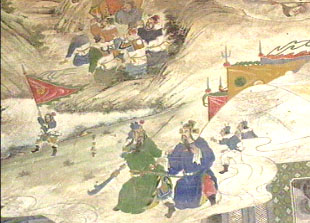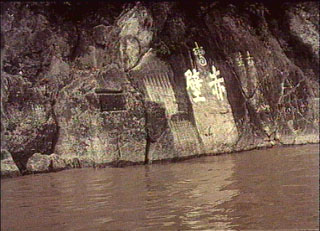 |
|
| Three Kingdoms |
| CCTV.COM 2002-05-22 11:05:32 |
|
 Three Kingdoms is the first popular novel in China. It is known to every household. It is not only loved for its fascinating plot, but it serves as a popular schoolbook for the general public. Three Kingdoms is the first popular novel in China. It is known to every household. It is not only loved for its fascinating plot, but it serves as a popular schoolbook for the general public.
The novel was written at the late 14th century. Its author Luo Guanzhong created this novel by collecting and collating tales about the Three Kingdoms in ballads and dramas and drawing on historical works such as Records of the Three Kingdoms, The Annotated Records of the Three Kingdoms and the Comprehensive Mirror for Aid of Government. He entitled his novel The Popular Romance of Three Kingdoms which is later called Three Kingdoms for short.
In a sense the novel is a historical textbook, because half of its contents is based on historical works. But the author's artistic treatment has made the tumultuous period of Three Kingdoms in the third century more intense and graphic. The authors' outlook on history seems not admirable. He made the history a struggle between good and bad guys.
The novel is often taken as a textbook on warfare and sometimes even as a guide for commercial war. This is because the whole novel is linked by diverse descriptions of wars. Beginning with the "Yellow Turban" peasant uprising and ending with the Kingdom Wu exterminated by the new regime of Jin, the novel portrays more than a hundred battles. In the description of the battles, less ink is used for combats in battlefield than for battle of wits. This illustrates the Chinese warfare theories with stress on strategies.
"The Campaign at Chibi" is one of the major campaigns in the novel. But in the eighty thousand words used in relating the story, only one tenth is about how Cao Cao's ships were set on fire. On the other hand, the author spares no ink on the battle of wits between the antagonists. This makes the campaign colourful and absorbing.
 "The Strategy of the Unguarded City" is a well-known story. The battle of wits and courage evolved in this story is even more breath-taking. When the city of Jieting is lost and the troops of a hundred thousand led by Sima Yi is pressing, Zhuge Liang has only two thousand and five hundred soldiers. But Zhuge Liang hides this small force and opens the city gate to show an unguarded city to the enemy. The experienced general Sima Yi is puzzled. Unable to detect the real situation, he withdraws his troops to avoid falling into a trap. "The Strategy of the Unguarded City" is a well-known story. The battle of wits and courage evolved in this story is even more breath-taking. When the city of Jieting is lost and the troops of a hundred thousand led by Sima Yi is pressing, Zhuge Liang has only two thousand and five hundred soldiers. But Zhuge Liang hides this small force and opens the city gate to show an unguarded city to the enemy. The experienced general Sima Yi is puzzled. Unable to detect the real situation, he withdraws his troops to avoid falling into a trap.
The descriptions of war in the novel are based on history but are not confined by historical documents. The author has added unpredictable details. "The Strategy of the Unguarded City" is not history. But such fabricated stories contain so much collective wisdom of ancient people, they are welcomed by the readers.
Three Kingdoms is more like a schoolbook on life. It presents the general people's understanding of morality and virtue. It demonstrates ancient Chinese outlook on the world, on life, on values and on beauty. The novel has exerted profound influence on Chinese people's thinking and this influence has reached neighbouring countries.
For the last six hundred years Three Kingdoms has been circulated in different forms. It is one of Chinese novels that have the most reprints and sell best. Since the sixteenth century it has found its way in different parts of the world. It has been translated into tens of languages.
 Since Three Kingdoms was published, it has been loved by readers. One reason is that it portrayed many life-like persons, like Liu Bei, Guan Yu, Zhang Fei, Zhou Yu, Huang Gai, Cao Cao and so on. Those are identifiable persons in history. Few novels can bear comparison with Three Kingdoms in terms of the multitude of represented characters. Zhuge Liang is one of the most successfully depicted figures in the novel. Since Three Kingdoms was published, it has been loved by readers. One reason is that it portrayed many life-like persons, like Liu Bei, Guan Yu, Zhang Fei, Zhou Yu, Huang Gai, Cao Cao and so on. Those are identifiable persons in history. Few novels can bear comparison with Three Kingdoms in terms of the multitude of represented characters. Zhuge Liang is one of the most successfully depicted figures in the novel.
Zhuge Liang, styled Kongming, was born in AD 181 and died in AD 234. He is an outstanding politician and strategist.
This is Longzhong near Xiangyang in today's Hubei Province. According to historical literature, Liu Bei who was a descendant of the imperial family aimed to seize the state power. He and his sworn brothers called on Zhuge Liang's cottage three times in AD 207, asking Zhuge Liang to come out to take an office. This story known as "Three Calls to a Cottage" has become synonymous with "seeking talent with eagerness" or "being courteous to the wise."
In his cottage in Longzhong the far-sighted Zhuge Liang proposed to Liu Bei that he should not confront Cao Cao who had a million-strong army. Instead, Liu Bei should ally with Sun Quan who had occupied the region east of Yangzi River for generations. At the same time, Zhuge Liang pointed out, Liu Bei could expand towards Jingzhou and Yizhou. This is the well-known "dialogue of Longzhong." At the time of this dialogue, Zhuge Liang was only 27 years old.
In AD 225 Zhuge Liang, then the prime minister of Kingdom Shu, decided to have a stable home front before a northern expedition. He ordered his army to march toward the region of present-day Yunnan and Guizhou provinces. By capturing and releasing the ethnic chieftain Meng Huo seven times, Zhuge Liang won over the local people.
After the home front was settled, Zhuge Liang began his plan of northern expedition. In AD 227 Zhuge Liang submitted the famous "Memorial on Sending Out the Troops" to the emperor. The memorial aiming at settlement of the central China and restoration of the Han regime is embodiment of the overall strategy in his dialogue of Longzhong.
To set Zhuge Liang into relief, the Three Kingdoms combined facts and fictitious elements to create the stories of Zhuge Liang's burning the enemy in Xinye, his beating learned scholars in heated argument, angering Zhou Yu to death, borrowing arrows from enemy by deploying straw boats, strategy of the unguarded city and so on. All these made Zhuge Liang the soul of wisdom in people's mind.
In AD 234 Zhuge Liang for the last time stationed his troops at Wuzhangyuan in present-day Meixian County, Shaanxi Province in confrontation with the army of Kingdom Wei. He died at his post before his troops triumphed. According to his will people buried him at the foot of Dingjun Mountain in today's Mianxian County, Shaanxi Province.
The famous maxim "work with devotion until death" from his "Memorial on Sending Out Troops" is the very picture of Zhuge Liang's life. He left his cottage to take a post at his age of 27 and after 27 years he died at his post. But the short period of 27 years has made him a hero remembered and honoured in Chinese history.
|
|
|
|
|
|
|
 |









